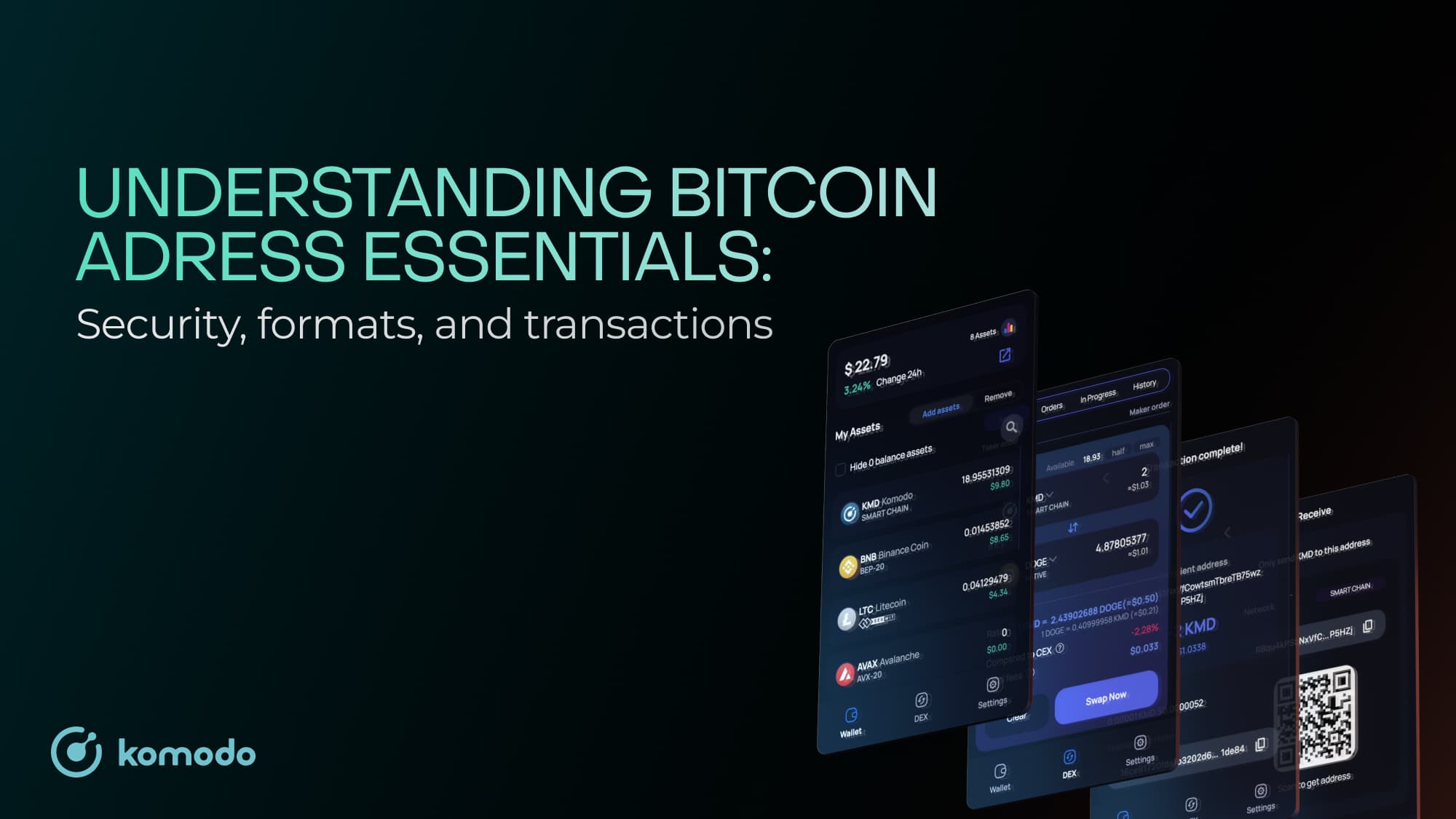A bitcoin address is essential in the world of cryptocurrency, serving as a unique identifier for transactions. This bitcoin address, a complex sequence of letters and numbers, is crucial for securely sending and receiving BTC. Understanding what a bitcoin address is and how it operates is fundamental for anyone involved in Bitcoin transactions.
Essentially, a bitcoin address is the public-facing component of your Bitcoin dealings, akin to an email address in digital communication. When delving into the realm of BTC, it’s vital to comprehend the significance of your bitcoin address. It's not just a random string; it's a carefully crafted part of the Bitcoin network's security, acting as a modified version of a Bitcoin public key. This makes your bitcoin address not only essential but also a secure way to engage in BTC transactions. Knowing and verifying your bitcoin address is a key step in managing BTC wallet addresses and ensuring smooth and secure transactions within the Bitcoin network.
Key Takeaways
- Unique Identifier: A bitcoin address is a unique identifier essential for securely sending and receiving BTC, akin to an email address in digital communication.
- Public Address: It serves as the public-facing component of your Bitcoin dealings, making it crucial for directing BTC transactions.
- Private Keys: A bitcoin address is linked to private-public key pairs, with the private key acting as a secure passcode. Maintaining the confidentiality of your private key is vital for protecting your Bitcoin assets.
- Security Features: Bitcoin addresses employ asymmetric encryption and hashing algorithms, providing enhanced security by safeguarding BTC transactions from unauthorized access.
- Formats and Verification: Bitcoin addresses come in various formats, typically starting with "1", "3", or "bc1". Verifying the correct address before transacting is essential, as errors are irreversible.
Bitcoin Address
A bitcoin address, a key element in the Bitcoin network, is essentially a more user-friendly version of a Bitcoin public key. It employs asymmetric encryption for secure private-public key pairs. A bitcoin address offers enhanced security with hashing algorithms, making it difficult to deduce the associated private key, thereby safeguarding BTC transactions. Unlike lengthy public keys, a bitcoin address is concise, aiding in user experience. Similar to an email address for digital communication, a bitcoin address is vital for directing BTC transactions. It's essential to use the correct bitcoin address, as errors are irreversible. Bitcoin addresses typically start with "1", "3", or "bc1", and come in different formats. Always confirm your bitcoin address in your wallet before transacting.
Note: Do not use example addresses for actual transactions.
What Does a Bitcoin Wallet Address Look Like?
Bitcoin wallet addresses comes in a variety of formats. Public keys are longer than public addresses. For additional security and ease-of-use, it's best to share public addresses rather than public keys. Both public keys and public addresses can be shown in compressed and uncompressed formats.
Bitcoin Public Key (Uncompressed):
042E6EFFCA888036CE13D7201AB58F567AE8C6E4A334835B70E6979B9B886AB0EBDB248474B6952A3ECECFAB6C8940ADC695BC54E0C8AEC33E5AB735F182F1BDD
Bitcoin Public Key (Compressed):
032E6EFFCA888036CE13D7201AB58F567AE8C6E4A334835B70E6979B9B88A6AB0E
Bitcoin Wallet Address:
1Awyd1QWR5gcfrn1UmL8dUBj2H1eVKtQhg
Bitcoin Wallet Address (Compressed):
1NMjw6MnDdvGFLN4w2iDYayXYhDMWy5LVL
Sites like bitaddress.org can be used to create a Bitcoin (BTC) paper wallet. Remember to save your secret (a.k.a. private key) in a secure place, and don't share it with anyone. Your share (a.k.a. Bitcoin wallet address) can be shared freely when you want to receive funds.
Private Keys
A bitcoin address is closely linked to private-public key pairs, with the private key being vital for securing your BTC. This private key acts like a secure passcode, granting exclusive access to the Bitcoin associated with that bitcoin address. The importance of maintaining the confidentiality of your private key cannot be overstated, as exposure risks unauthorized access to your BTC. Both bitcoin addresses and private keys come in various formats, with private keys often displayed in hexadecimal form. It's essential to secure your private key diligently to protect your Bitcoin assets effectively.
Bitcoin Private Key: DA46B559F21B3E955BB1925C964AC5C3B3D72FE1BF37476A104B0E7396027B65
Accessing BTC relies on private keys, managed by custodial wallets (like Coinbase, Kraken) or non-custodial wallets (such as Komodo Wallet, BRD). Custodial wallets maintain the keys, accessible via email and password, yet pose risks if compromised. Non-custodial wallets, more secure, let users control their keys. Recovery often depends on a seed phrase, a series of unique words generated during wallet creation. This phrase, kept secret, is essential for retrieving funds if passwords are lost. For example, a seed phrase might be: "moldy reply therapeutic tense car add knife cork chase attention type please." This phrase must be securely stored to ensure access to your Bitcoin funds.
Bitcoin Wallet
Bitcoin addresses function like key rings, capable of holding multiple private-public key pairs. Whether using a custodial or non-custodial wallet, creating a new bitcoin address is a simple process, generally requiring just one password. These wallets strike a balance between security and user-friendliness, making them crucial for managing bitcoin addresses and transactions. They offer an intuitive interface, a contrast to the complexity of command-line transactions, and are versatile, accessible on various devices including computers, smartphones, and hardware gadgets.
Essentials of BTC Transactions
Grasping the fundamentals of using a bitcoin address is key to safely sending and receiving BTC. This understanding is vital to avoid common mistakes often encountered in Bitcoin transactions. By familiarizing yourself with the essential aspects of how a bitcoin address operates, you can navigate the process with greater confidence and security. This knowledge not only ensures successful transactions but also helps in safeguarding your digital assets.
The 'Single-Use Token' Paradigm
Bitcoin addresses are akin to email IDs but are best used as 'single-use tokens'. Reusing an address is feasible, yet each new transaction ideally warrants a fresh address for enhanced privacy and security.
In terms of privacy, all bitcoin transactions are publicly visible on the blockchain, unlike the private nature of emails. Using blockchain explorers, anyone can trace the history and balance of a bitcoin address. Therefore, employing a new address for each transaction or interaction is recommended for privacy.
For security, past vulnerabilities in Bitcoin's digital signatures might have exposed private keys. While these issues have been fixed, the practice of using new addresses for each transaction remains a prudent measure to guard against potential future security threats, ensuring both privacy and security in Bitcoin dealings.
No Return To Sender Function
Bitcoin transactions lack a return feature. Sending BTC back to an address is like returning mail, but without certainty that the same person controls that address. Adherents of the 'single-use token' principle often discard the address and its key after one use. So, it's crucial to confirm the recipient can accept funds on a previously-used address.
Varieties of Cryptocurrency Bitcoin Addresses
Bitcoin addresses are uniquely designed for the BTC blockchain and should only be used for BTC transactions. Each cryptocurrency, including Bitcoin (BTC) and Bitcoin SV (BSV), operates on its own blockchain and has distinct address formats. Despite similar structures, sending BTC to a BSV address, a frequent error, renders the BTC unusable on the Bitcoin SV network, and the same applies vice versa. However, there are methods to recover and redirect these funds back to the appropriate blockchain.
For other cryptocurrencies like Ethereum, which have different address formats, most wallet software incorporates a bitcoin address validator. This function prevents erroneous transactions, such as attempting to send BTC to an Ethereum address, by displaying an error message. This safeguard is crucial in helping users avoid transferring funds to incompatible blockchain addresses.
AtomicDEX offers a non-custodial wallet and decentralized exchange for BTC and altcoins.
Bitcoin Wallet Formats
Several bitcoin address formats exist for conducting transactions on the Bitcoin network, each corresponding to different payment methods. Apart from Pay-to-PubKey (P2PK), each format has its unique bitcoin address structure. Most Bitcoin wallet software and blockchain explorers allow users to distinguish these payment methods by their specific bitcoin address formats. This variety in address formats plays a crucial role in facilitating diverse transaction types and ensuring compatibility across different Bitcoin network protocols. Understanding these formats helps in correctly executing and verifying transactions on the Bitcoin network.
P2PK
Pay To Pubkey (P2PK) allows users to send funds to a specific public key rather than a bitcoin address. However, most users prefer the advantages of using bitcoin addresses over public keys, making P2PK less common.
P2PKH
Pay To Pubkey Hash (P2PKH) is considered to be more secure and more user-friendly than P2PK. P2PKH creates a shorter representation of the recipient's public key called a pubkey hash that adds an extra layer of encryption. P2PKH addresses start with the number ‘1’.
P2SH
Pay To Script Hash (P2SH) introduces features not available in the P2PK or P2PKH formats. P2SH is primarily used for multisig transactions, which require signatures from multiple private keys to access the funds. P2SH bitcoin addresses begin with the number '3'.
Bech32
Bech32 ensures full compatibility with SegWit blocks on the Bitcoin network. SegWit blocks relocate BTC transaction data (like digital signatures and Bitcoin scripts) to extended blocks. Bech32 bitcoin addresses initiate with the phrase 'bc1'.
Learn More About Payments On the Bitcoin Network
If you've found this overview of Bitcoin wallet addresses helpful and want to learn more about similar topics, check out Komodo’s Blockchain Fundamentals series. There are dozens of informative articles to help you learn all about how blockchain technology works. You can read more about related topics such as Bitcoin private keys and asymmetric encryption.
To keep up with Komodo's progress, you can join Komodo's Forum and sign up for the monthly newsletter.
Begin your blockchain journey with Komodo today.
📧Komodo Newsletter
If you'd like to learn more about blockchain technology and keep up with Komodo's progress, subscribe to our newsletter. Begin your blockchain journey with Komodo today.

